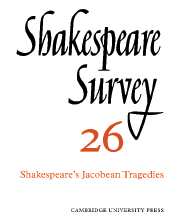Book contents
- Frontmatter
- Studies in Shakespearian and Other Jacobean Tragedy, 1918–1972: A Retrospect
- ‘Form and Cause Conjoin’d’: ‘Hamlet’ and Shakespeare’s Workshop
- The Art of Cruelty: Hamlet and Vindice
- From Tragedy to Tragi-Comedy: ‘King Lear’ as Prologue
- Jacobean Tragedy and the Mannerist Style
- ‘King Lear’ and Doomsday
- Macbeth on Horseback
- Shakespeare’s Misanthrope
- ‘Antony and Cleopatra’ and ‘Coriolanus’, Shakespeare’s Heroic Tragedies: A Jacobean Adjustment
- Shakespeare’s Venus and Adonis Sonnets
- Orlando: Athlete of Virtue
- The Unfolding of ‘Measure for Measure’
- Shakespeare and the Eye
- No Rome of Safety: The Royal Shakespeare Season 1972 Reviewed
- The Year's Contributions to Shakespearian Study 1 Critical Studies
- 2 Shakespeare’s Life, Times, and Stage
- 3 Textual Studies
- Index
- Plate section
‘Antony and Cleopatra’ and ‘Coriolanus’, Shakespeare’s Heroic Tragedies: A Jacobean Adjustment
Published online by Cambridge University Press: 28 March 2007
- Frontmatter
- Studies in Shakespearian and Other Jacobean Tragedy, 1918–1972: A Retrospect
- ‘Form and Cause Conjoin’d’: ‘Hamlet’ and Shakespeare’s Workshop
- The Art of Cruelty: Hamlet and Vindice
- From Tragedy to Tragi-Comedy: ‘King Lear’ as Prologue
- Jacobean Tragedy and the Mannerist Style
- ‘King Lear’ and Doomsday
- Macbeth on Horseback
- Shakespeare’s Misanthrope
- ‘Antony and Cleopatra’ and ‘Coriolanus’, Shakespeare’s Heroic Tragedies: A Jacobean Adjustment
- Shakespeare’s Venus and Adonis Sonnets
- Orlando: Athlete of Virtue
- The Unfolding of ‘Measure for Measure’
- Shakespeare and the Eye
- No Rome of Safety: The Royal Shakespeare Season 1972 Reviewed
- The Year's Contributions to Shakespearian Study 1 Critical Studies
- 2 Shakespeare’s Life, Times, and Stage
- 3 Textual Studies
- Index
- Plate section
Summary
Shakespeare wrote many plays about heroes, but only Antony and Cleopatra and Coriolanus are distinguished by heroic appeals that are exclusively and definitively aristocratic. Coriolanus and Cleopatra make strange bedfellows; yet despite their different life styles they share an unyielding horror of being scrutinized and judged by a vulgar audience. When the Queen of Egypt contemplates her dishonor at the hands of Octavius, her most terrifying thought is the vulgarization of her nobility in a dramatic representation for a popular Roman audience:
Cleopatra. Now, Iras, what think'st thou? / Thou an Egyptial puppet shall be shown / In Rome as well as I. Mechanic slaves, / With greasy aprons, rules, and hammers, shall / Uplift us to the view; in their thick breaths, / Rank of gross diet, shall we be enclouded, / And forc'd to drink their vapour.”
Iras. The gods forbid!
Cleopatra. Nay, 'tis most certain, Iras. Saucy lictors Will catch at us like strumpets, and scald rhymers
Ballad us out o' tune; the quick comedians Extemporally will stage us, and present Our Alexandrian revels; Antony Shall be brought drunken forth, and I shall see Some squeaking Cleopatra boy my greatness F th' posture of a whore.
(v, ii, 206-20)Cleopatra dazzlingly holds up a mirror to the world of the Globe playhouse. Her speculation about a Roman play reflects the actual dramatic event of Shakespeare's Roman play: the Roman populace looks exactly like the London populace crowded around her open stage; Cleopatra is in fact being boyed by some incredible young master and often, no doubt, in the exaggerated posture of a whore; the Alexandrian revels have already generated the laughter to encloud the Globe with the vapor of garlic.
- Type
- Chapter
- Information
- Shakespeare Survey , pp. 95 - 102Publisher: Cambridge University PressPrint publication year: 1973
- 2
- Cited by

